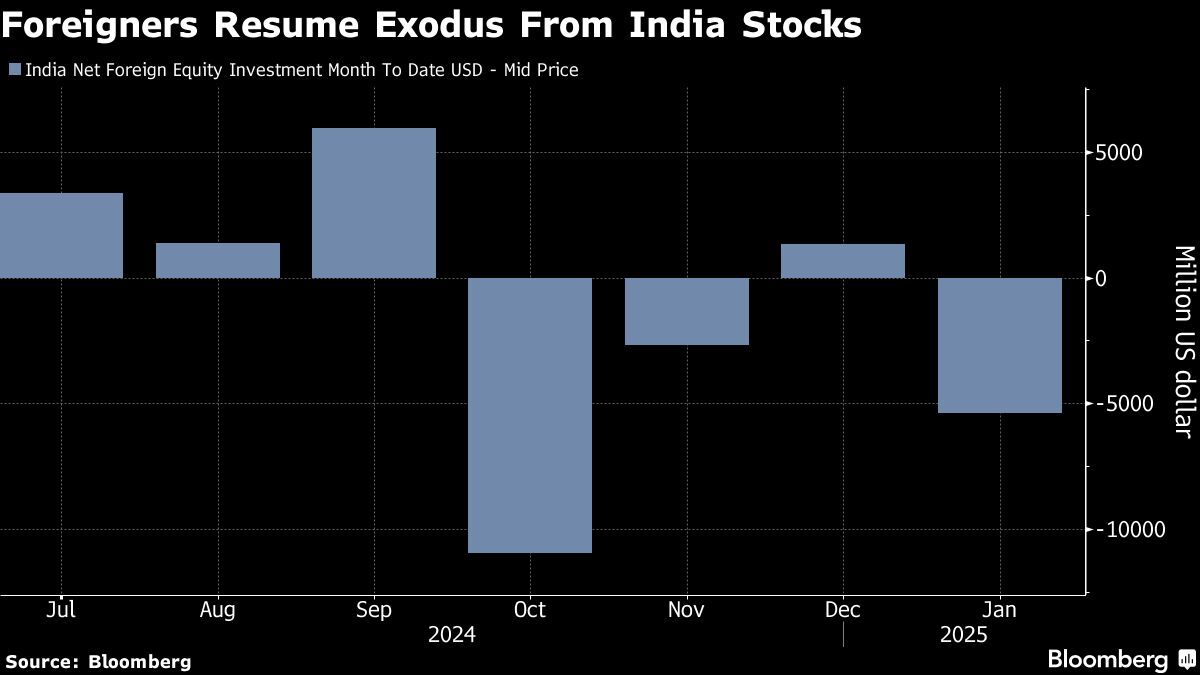
(Jan 22): Stocks in India look set for further declines as foreign investors resumed selling shares, amid persistent worries over company earnings growth and sluggish consumption.
Global funds pulled out US$5.4 billion (RM24.0 billion) from Indian equities on a net basis in January after a respite last month, set for the worst start to a year. While inflows into mutual funds remain robust, the persistent selling by foreigners have countered much of that support.
Worries about India’s growth trajectory are intensifying as the latest data suggests the country is headed for its slowest economic expansion since the pandemic. The benchmark NSE Nifty 50 Index fell to its lowest since June on Tuesday, taking its drop from the September peak to 12%, as weak corporate results so far this season dashed hopes of a near-term revival.
“The exodus of foreign money from India may continue due to an earnings crunch and slowdown in parts of consumption,” said Nitin Chanduka, a strategist at Bloomberg Intelligence in Singapore. Foreign investors have mainly sold financials, energy and sectors vulnerable to slowing growth, he said.
Global funds have withdrawn over US$17 billion from the South Asian nation’s equities since October, when the foreign exodus began.
About a fortnight into the December-ending quarter’s results season, only three of the 10 NSE Nifty 50 Index members that have reported so far have beaten estimates.
“Almost all sectors have seen lower earnings, and the signs for the third quarter so far are not very promising,” said Kunal Vora, the head of Indian equity research at BNP Paribas. The consensus expectation of 14%-15% earnings growth for Nifty members next fiscal year are built on “high levels of optimism”, he said.
Urban Demand
Investor focus on Wednesday will be on earnings reports, including Hindustan Unilever Ltd, for clues on a demand recovery. The seller of Dove soap and Bru coffee will likely see subdued volume and revenue growth in the three-months through December as urban demand — which accounts for two-thirds of the total — has lagged levels seen in rural areas for three quarters.
Rising expectations of a rotation towards China after US President Donald Trump delivered a softer tariff approach may also hurt foreign demand for Indian assets. While Trump said he is considering 10% tariffs on Chinese goods, it is lower than the levies of 60% he threatened on the campaign trail.
“There is some hope of a rotation to China from markets like India given Trump’s reconciliatory tone on tariffs and TikTok so far,” said Kok Hoong Wong, the head of institutional equities sales trading at Maybank Securities. “Perhaps China may be able to strike some deal” with the US, he said.
Indian shares remain among the world’s most expensive despite the slide, trading at close to 19 times forward earnings. Investor focus is now turning to the federal budget announcement on Feb 1, where they hope for measures to stimulate consumption and provide a boost to growth.
“India remains off the investors’ radar with most participants seeing further decline in the equity markets,” Bank of America analysts including Ritesh Samadhiya wrote in a note on Tuesday, citing a survey of fund managers.
Uploaded by Tham Yek Lee
- Malaysia hit with 24% US reciprocal tariff effective April 9
- Malaysia won’t retaliate, will negotiate with US on tariffs — Miti
- Apple production hubs, including Malaysia, hit by tariffs
- Glovemakers rebound as investors see competitive advantages
- Trump’s tariffs on Asean: Nothing to dread, everything to fear
- Gas pipeline fire: 'Home safety first, too early for legal action', says residents' association
- Investors dive for cover as Trump tariffs skittle stocks
- Sarawak to gazette gas corridors to prevent pipeline fire incidents
- Malaysia's semicon firms brace for potential future US action after dodging tariffs
- US coffee drinkers face pricier cup as tariffs hit key supplier Vietnam

